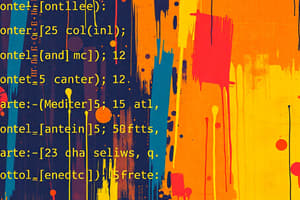Podcast
Questions and Answers
What is the output of the following code: if (x > 5) {puts("Greater than 5");} else {puts("Less than or equal to 5");} if x is 3?
What is the output of the following code: if (x > 5) {puts("Greater than 5");} else {puts("Less than or equal to 5");} if x is 3?
- Error
- Less than or equal to 5 (correct)
- No output
- Greater than 5
What is the output of the following code: puts(x > 5? "Greater than 5" : "Less than or equal to 5"); if x is 8?
What is the output of the following code: puts(x > 5? "Greater than 5" : "Less than or equal to 5"); if x is 8?
- Less than or equal to 5
- Error
- Greater than 5 (correct)
- No output
What is the output of the following code: if (y == 0) {puts("Zero");} else {puts("Non-zero");} if y is 0?
What is the output of the following code: if (y == 0) {puts("Zero");} else {puts("Non-zero");} if y is 0?
- Error
- Zero (correct)
- No output
- Non-zero
What is the output of the following code: puts(y == 0? "Zero" : "Non-zero"); if y is 4?
What is the output of the following code: puts(y == 0? "Zero" : "Non-zero"); if y is 4?
What is the output of the following code: if (z > 10) {puts("Greater than 10");} else {puts("Less than or equal to 10");} if z is 12?
What is the output of the following code: if (z > 10) {puts("Greater than 10");} else {puts("Less than or equal to 10");} if z is 12?
What is the output of the following code: puts(z > 10? "Greater than 10" : "Less than or equal to 10"); if z is 8?
What is the output of the following code: puts(z > 10? "Greater than 10" : "Less than or equal to 10"); if z is 8?
What is the output of the following code: if (x == 5) {puts("Five");} else {puts("Not Five");} if x is 5?
What is the output of the following code: if (x == 5) {puts("Five");} else {puts("Not Five");} if x is 5?
What is the output of the following code: puts(x == 5? "Five" : "Not Five"); if x is 3?
What is the output of the following code: puts(x == 5? "Five" : "Not Five"); if x is 3?
What is the primary security risk of directly inserting user input into a format string?
What is the primary security risk of directly inserting user input into a format string?
What is the purpose of the free() function in memory management?
What is the purpose of the free() function in memory management?
What is the term for a pointer that points to memory that has already been freed?
What is the term for a pointer that points to memory that has already been freed?
What is the main advantage of using printf() statements for debugging?
What is the main advantage of using printf() statements for debugging?
Which debugging tool is specifically designed to detect memory leaks and errors?
Which debugging tool is specifically designed to detect memory leaks and errors?
What is the purpose of calloc() in memory management?
What is the purpose of calloc() in memory management?
What is the primary consequence of forgetting to free() allocated memory?
What is the primary consequence of forgetting to free() allocated memory?
What is the term for unreleased memory that is no longer needed?
What is the term for unreleased memory that is no longer needed?
What is the primary benefit of performing a code review?
What is the primary benefit of performing a code review?
What is the primary purpose of using gdb for debugging?
What is the primary purpose of using gdb for debugging?
Flashcards
Format String Vulnerabilities
Format String Vulnerabilities
A security risk where directly inserting user input into a format string can allow attackers to execute malicious code or read memory.
Memory Leak
Memory Leak
Unreleased memory that is no longer needed by a program, which consumes system resources and degrades performance.
Dangling Pointer
Dangling Pointer
A pointer that references freed memory.
free() function
free() function
Signup and view all the flashcards
calloc() function
calloc() function
Signup and view all the flashcards
Code Review
Code Review
Signup and view all the flashcards
printf() debugging
printf() debugging
Signup and view all the flashcards
gdb
gdb
Signup and view all the flashcards
Valgrind
Valgrind
Signup and view all the flashcards
Conditional Logic Output
Conditional Logic Output
Signup and view all the flashcards
Study Notes
Output of Code Snippets
- When
xis 3 in the first code block, the output is "Less than or equal to 5". - When
xis 8 in the second code block, the output is "Greater than 5". - When
yis 0 in the third code block, the output is "Zero". - When
yis 4 in the fourth code block, the output is "Non-zero". - When
zis 12 in the fifth code block, the output is "Greater than 10". - When
zis 8 in the sixth code block, the output is "Less than or equal to 10". - When
xis 5 in the seventh code block, the output is "Five". - When
xis 3 in the eighth code block, the output is "Not Five".
Security Risks in Code
- Directly inserting user input into a format string can lead to format string vulnerabilities, allowing attackers to execute arbitrary code or read memory.
Memory Management Functions
- The
free()function is used to deallocate memory that was previously allocated, preventing memory leaks. - A pointer that references freed memory is known as a "dangling pointer".
calloc()allocates memory for an array and initializes all bytes to zero, providing a safer initialization option compared tomalloc().
Debugging Concepts
- Using
printf()statements for debugging allows developers to track variable values at different execution stages, making it easier to pinpoint errors. - Tools like Valgrind are specifically designed to detect memory leaks and errors during program execution.
Consequences of Memory Mismanagement
- Forgetting to
free()allocated memory can lead to memory leaks, which consume system resources and potentially degrade performance. - Unreleased memory that is no longer needed is termed as "memory leak".
Benefits of Code Review
- The primary benefit of performing a code review is to identify bugs and improve code quality by leveraging collective knowledge and different perspectives.
Debugging Tool Purpose
- The primary purpose of using
gdb(GNU Debugger) is to allow developers to examine and control the execution of their program, enabling step-by-step debugging to isolate issues.
Studying That Suits You
Use AI to generate personalized quizzes and flashcards to suit your learning preferences.





